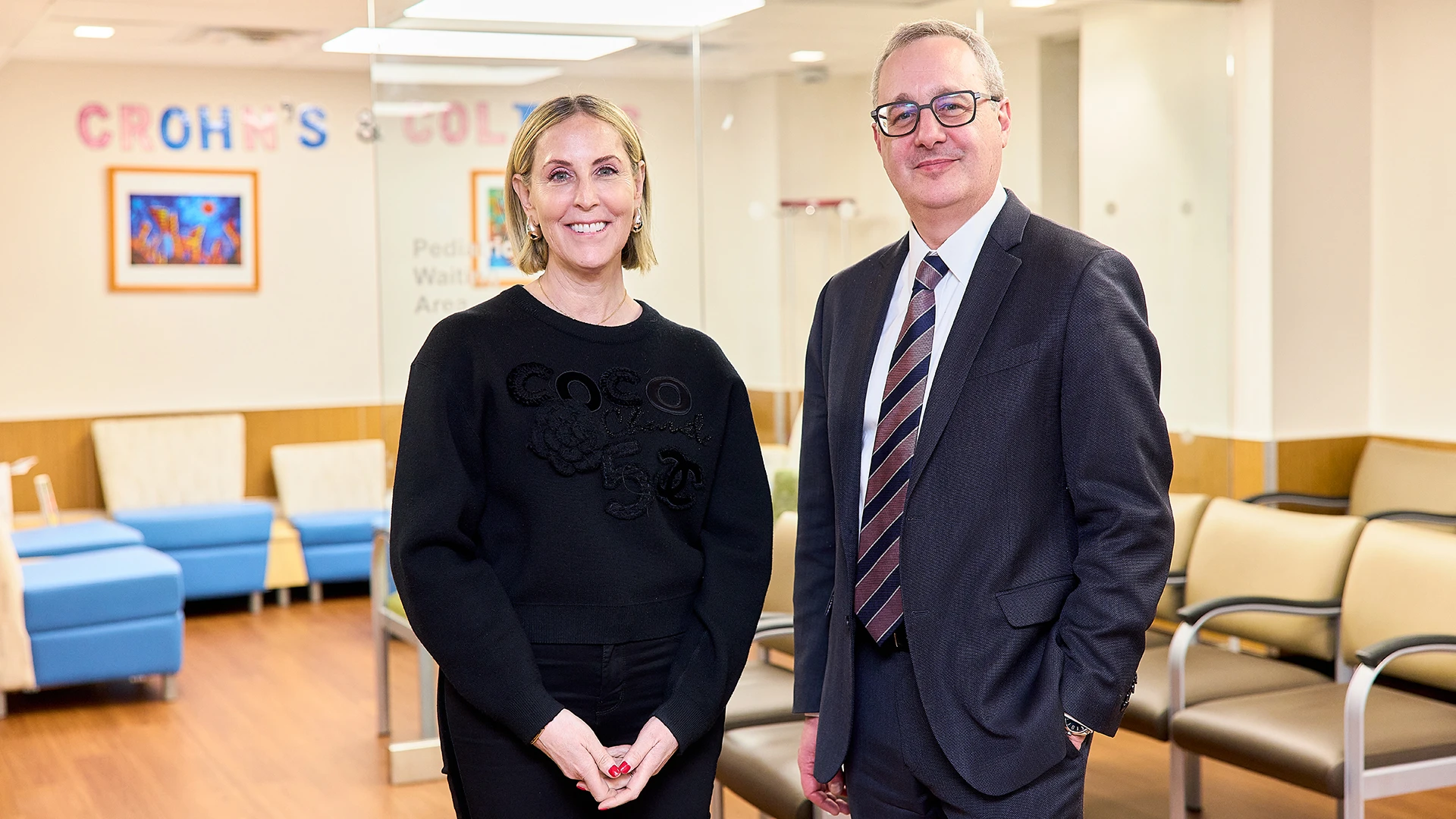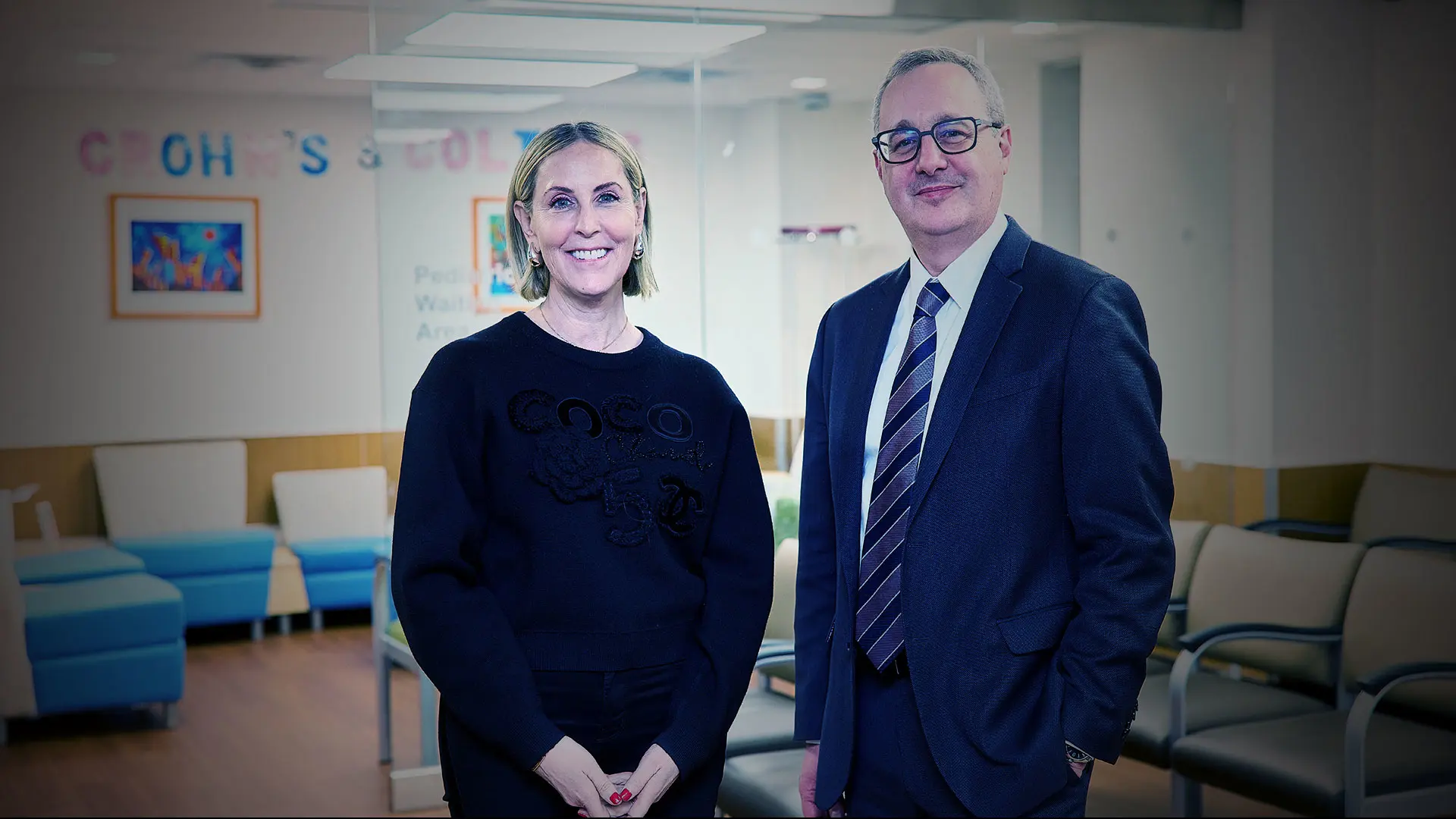Even with a surge of new biologics hitting the market, inflammatory bowel disease (IBD) remains a serious health and quality-of-life issue for millions of people due to limited drug response, increased risk of infection or cancer, and loss of clinical benefit over time. Which is why the approval of mirikizumab by the U.S. Food and Drug Administration at the end of October, based on a pair of groundbreaking trials led by Mount Sinai’s gastroenterology team, is such a promising ray of hope for adults with ulcerative colitis (UC).
Mirikizumab (Omvoh™, from Lilly) is the first and only infusion treatment that selectively targets the p19 subunit of interleukin-23 (IL-23), which plays a major role in inflammation related to UC. The LUCENT studies that led to its approval consisted of two randomized phase 3 clinical trials: one a 12-week induction and the other a 40-week maintenance study, amounting to 52 weeks of continuous treatment. All patients had received past treatments, including biologics that either did not work, stopped working, or proved intolerable for users. The studies were published in The New England Journal of Medicine.
“For patients with a chronic condition such as ulcerative colitis, it’s not just about getting them well, but keeping them well, and what we see with mirikizumab are very high rates of maintaining clinical response and remission over a year,” says senior author Bruce Sands, MD, MS, the Dr. Burrill B. Crohn Professor of Medicine and Chief of the Dr. Henry D. Janowitz Division of Gastroenterology at the Icahn School of Medicine at Mount Sinai. “Importantly, we didn’t see any increased risk of cancer or different types of infections that may occur with anti-tumor necrosis factor (TNF) antibodies and some of the other agents commonly used to treat ulcerative colitis.”
Among the impressive results from the multisite trials were that following the 12-week induction phase, 65 percent of patients achieved clinical response and 24 percent reached clinical remission (compared to 43 percent and 15 percent, respectively, for placebo). Noteworthy, too, was that among those who achieved clinical response at 12 weeks with mirikizumab, 51 percent overall and 45 percent of those who failed prior treatment with a biologic or Janus kinase inhibitor achieved clinical remission at one year.
Researchers observed positive outcomes well beyond a year. “Approximately three-quarters of patients who completed the 52 weeks as responders or remitters continued to respond at week 104, suggesting long-term durable effects with less than 3 percent of patients discontinuing therapy due to an adverse event,” notes co-author Marla Dubinsky, MD, Professor of Pediatrics, and Medicine (Gastroenterology), at Icahn Mount Sinai and Chief of the Division of Pediatric Gastroenterology at Mount Sinai Kravis Children’s Hospital. “The results also provide the first reported efficacy of mirikizumab in pediatric patients with ulcerative colitis.”

Marla Dubinsky, MD, and Bruce Sands, MD, MS, led the studies that paved the way for approval of mirikizumab as a new treatment for ulcerative colitis.
Some of the greatest improvements were evidenced in bowel urgency—among the most disruptive symptoms for patients with UC. Alleviation of symptoms was observed as early as three weeks by patients in the LUCENT studies. Validating these findings was the introduction of an Urgency Numeric Rating Scale of 0 to 10, with 0 indicating no bowel urgency and 10 being the highest urgency. “This is the first-ever use of a patient-reported outcomes measure of bowel urgency for a therapeutic agent in clinical trials,” observes Dr. Sands, “and illustrates the rigor with which the LUCENT studies were conducted.”
Rapid symptom improvement was also evidenced for rectal bleeding and stool frequency, other disruptive hallmarks of ulcerative colitis. “The approval of mirikizumab represents a novel scientific achievement by providing a treatment that may offer relief from all three key symptoms, regardless of past biologic use,” says Dr. Sands.
As part of his leading-edge work on innovative therapeutics for IBD—for which he is known nationally—Dr. Sands is currently active in a pair of phase 2 clinical studies evaluating a potentially powerful combination therapy for both ulcerative colitis and Crohn’s disease. In a study known as DUET-CD, for which he is Principal Investigator, Dr. Sands is examining the safety and efficacy of guselkumab, an IL-23 subunit 19 antagonist, and golimumab, an anti-TNF antibody, on adults with moderate-to-severe Crohn’s disease. The same investigational medicines are being studied for ulcerative colitis in the DUET-UC clinical trial.
“Earlier studies in animal models have suggested that if you block TNF and IL-23 at the same time, you may get a synergistic effect and potential doubling of remission rates beyond monotherapy alone,” says Dr. Sands. The more expansive goal, he adds, is to identify novel mechanisms of action that could pave the way for important new classes of therapeutics, or improve on the safety and efficacy of those currently available.
“Because it’s so difficult for physicians to predict who is going to respond to which therapy,” he acknowledges, “we always need more options to effectively treat the greatest number of patients with IBD.”
